Filter by
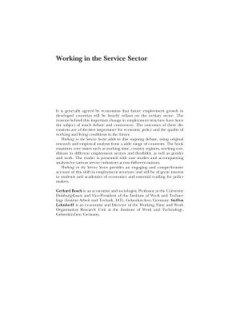
Working in the Service Sector
The rise to prominence of the service sector - heralded over half a century ago as the great hope for the twenty-first century - has come to fruition. In many cases, employment in the service sector now outnumbers that in manufacturing sectors, and it is accepted that in all developed countries, the service sector is the only one in which employment will grow in future. The reasons for this is …
- Edition
- -
- ISBN/ISSN
- 9780203500583
- Collation
- -
- Series Title
- -
- Call Number
- 650
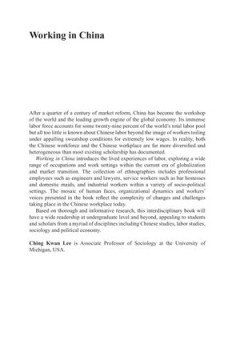
Working in China
After a quarter of a century of market reform, China has become the workshop of the world and the leading growth engine of the global economy. Its immense labour force accounts for some twenty-nine per cent of the world's total labour pool but all too little is known about Chinese labour beyond the image of workers toiling under appalling sweatshop conditions for extremely low wages. Working in…
- Edition
- -
- ISBN/ISSN
- 9780203966983
- Collation
- -
- Series Title
- -
- Call Number
- 650
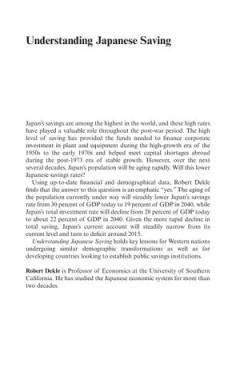
Understanding japanese savings
Japan's savings are among the highest in the world, and these high rates have played a valuable role throughout the post-war period. However, over the next several decades, Japan's population will be ageing rapidly. Will this lower Japanese savings rates? Using up-to-date financial and demographical data, author Robert Dekle finds that the answer to this question is an emphatic 'yes'. Understan…
- Edition
- -
- ISBN/ISSN
- 9780203645291
- Collation
- -
- Series Title
- -
- Call Number
- 650
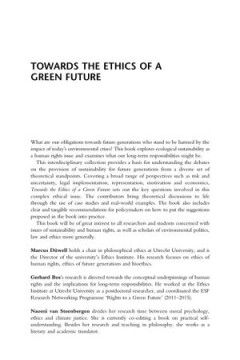
Toward the ethics of a green future
What are our obligations towards future generations who stand to be harmed by the impact of today’s environmental crises? This book explores ecological sustainability as a human rights issue and examines what our long-term responsibilities might be. This interdisciplinary collection of chapters provides a basis for understanding the debates on the provision of sustainability for future genera…
- Edition
- -
- ISBN/ISSN
- 9781315115788
- Collation
- -
- Series Title
- -
- Call Number
- 650
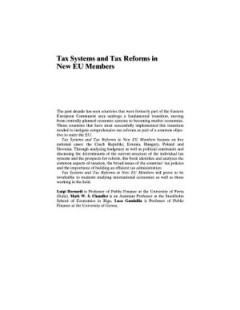
Tax Systems and Tax Reforms in New EU Member States
Building on the work carried out in the 2004 Routledge book, Tax Systems and Tax Reforms in Europe, an international team of contributors now turn their attention to the new EU member states. The book compares conditions in the new and potential EU Member states to those in the long-standing EU countries. Topics covered include: * A Comparative View of Taxation in the EU and in New Members * Ta…
- Edition
- -
- ISBN/ISSN
- 9780203023075
- Collation
- -
- Series Title
- -
- Call Number
- 650
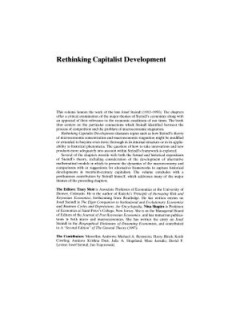
Rethinking Capitalist Development
This collection honours the work of the eminent economist Josef Steindl. Steindl's work is illuminated through a critical appraisal of its central constructs with a focus on its relevance to current economic conditions. This collection charts the thinking of one of the leading economic theorists of the twentieth century.
- Edition
- -
- ISBN/ISSN
- 9780203645901
- Collation
- -
- Series Title
- -
- Call Number
- 650
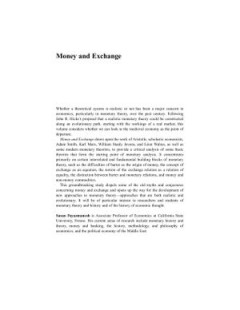
Money and Exchange
Whether a theoretical system is realistic or not has been a concern in economics, particularly in monetary theory, over the past century. Following John R. Hicks’ proposal that a realistic monetary theory could be constructed along an evolutionary path, starting with the workings of a real market, this volume considers whether we can look to the medieval economy as the point of departure. Dra…
- Edition
- -
- ISBN/ISSN
- 9780203965580
- Collation
- -
- Series Title
- -
- Call Number
- 650
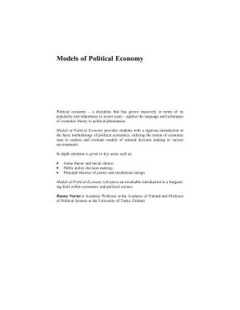
Monetary Policy and Unemployment
This book pulls together papers presented at a conference in honour of the 1981 Nobel Prize Winner for Economic Science, the late James Tobin. Among the contributors are Olivier Blanchard, Edmund Phelps, Charles Goodhart and Marco Buti. One of the main aims of the conference was to discuss what potential role monetary policy has on economic activity and unemployment reduction in three key curre…
- Edition
- -
- ISBN/ISSN
- 9780203329580
- Collation
- -
- Series Title
- -
- Call Number
- 650

Models of Political Economy
Models of Political Economy will introduce students to the basic methodology of political economics. It covers all core theories as well as new developments including: decision theory game theory mechanism design games of asymmetric information. Hannu Nurmi's text will prove to be invaluable to all students who wish to understand this increasingly technical field.
- Edition
- -
- ISBN/ISSN
- 9780203358559
- Collation
- -
- Series Title
- -
- Call Number
- 650
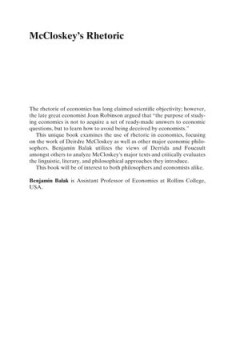
McCloskey's Rhetoric
The rhetoric of economics has long claimed scientific objectivity, however the late, great economist Joan Robinson argued that ‘the purpose of studying economics is not to acquire a set of ready-made answers to economic questions, but to learn how to avoid being deceived by economists.’ This unique book examines the use of rhetoric in economics, focusing on the work of Deirdre McCloskey and…
- Edition
- -
- ISBN/ISSN
- 9780203715116
- Collation
- -
- Series Title
- -
- Call Number
- 650
 Computer Science, Information & General Works
Computer Science, Information & General Works  Philosophy & Psychology
Philosophy & Psychology  Religion
Religion  Social Sciences
Social Sciences  Language
Language  Pure Science
Pure Science  Applied Sciences
Applied Sciences  Art & Recreation
Art & Recreation  Literature
Literature  History & Geography
History & Geography